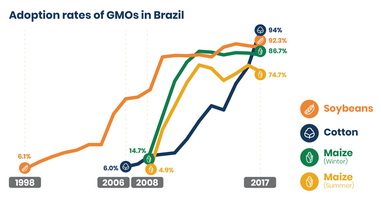
Study: 20 Years of GM Adoption in Brazil Increased Farmers' Profits, Boosted Economy, and Preserved the Environment
September 5, 2018| |
 In 2018, Brazil has completed 20 years since GMOs were adopted in agriculture. Throughout this period, what stands out are the benefits for farmers resulting from planting genetically modified (GM) soybeans, corn, and cotton. There has been, for example, a reduction in the application of pesticides per hectare and there have been fewer losses caused by pests. Consequently, the productivity and yield of the GM crops have been, on average, higher than conventional crops. The data is part of a study, 20 Years of GMOs in Brazil: Environmental, Economic, and Social Impacts, which was conducted by the Agroconsult consultancy with support from the Council for Information on Biotechnology (CIB Brazil).
In 2018, Brazil has completed 20 years since GMOs were adopted in agriculture. Throughout this period, what stands out are the benefits for farmers resulting from planting genetically modified (GM) soybeans, corn, and cotton. There has been, for example, a reduction in the application of pesticides per hectare and there have been fewer losses caused by pests. Consequently, the productivity and yield of the GM crops have been, on average, higher than conventional crops. The data is part of a study, 20 Years of GMOs in Brazil: Environmental, Economic, and Social Impacts, which was conducted by the Agroconsult consultancy with support from the Council for Information on Biotechnology (CIB Brazil).
Throughout the period being analyzed, the profit obtained per hectare from GM soybeans was up to 26% higher than the conventional variety. For corn, the performance differential reached 64% in the summer harvest and 152% in the winter harvest. In the case of cotton, GM seeds have a margin of 12% higher than non-modified ones. "The positive effect of this technology on agriculture and on the quality of life, level of education and profit for the population is unquestionable," says executive-director of the CIB, Adriana Brondani.
Read the complete report from CIB.
| |
Biotech Updates is a weekly newsletter of ISAAA, a not-for-profit organization. It is distributed for free to over 22,000 subscribers worldwide to inform them about the key developments in biosciences, especially in biotechnology. Your support will help us in our mission to feed the world with knowledge. You can help by donating as little as $10.
-
See more articles:
-
News from Around the World
- Warming Climate to Increase Crop Losses Due to Insect Pests
- World's Top Universities Join Forces to Fight Hunger
- Farmer Leader in Ghana Shifts Support to Agri-biotech After Getting Facts
- Researchers Find New Genes in Soybean Linked to Aphid Resistance
- Brazilian Court Lifts Glyphosate Ban
- Study: 20 Years of GM Adoption in Brazil Increased Farmers' Profits, Boosted Economy, and Preserved the Environment
- Sorghum's Weed-Killing Power Transferred to Rice
- Scientists Find Molecule for Boosting Plant Growth With Less Nitrogen
- Research Sheds Light on Plant Signaling
- Plastomes Reveal How Eggplants Became Asian
-
Research Highlights
- Scientists Develop CasPER, a Method for Enzyme Modification
- Two Methods Used in Finding Capsaicinoid Candidate Genes in Hot Pepper
-
Beyond Crop Biotech
- Researchers Plan to Release Transgenic Chestnut to Save the Tree
- Opium Poppy Genome Decoded
-
Announcements
- 2018 International Conference on Biotechnology and Bioengineering (ICBB2018)
-
Plant
- Scientists Edit Gene for Plant Height in Tomato
- Cas9 and Cas12a Compared in Targeted Gene Editing in Maize
- Method for Production of Non-transgenic Gene-edited Plants, Developed for Cloned Plants
-
Read the latest: - Biotech Updates (April 24, 2024)
- Gene Editing Supplement (April 24, 2024)
- Gene Drive Supplement (February 22, 2023)
-
Subscribe to BU: - Share
- Tweet
